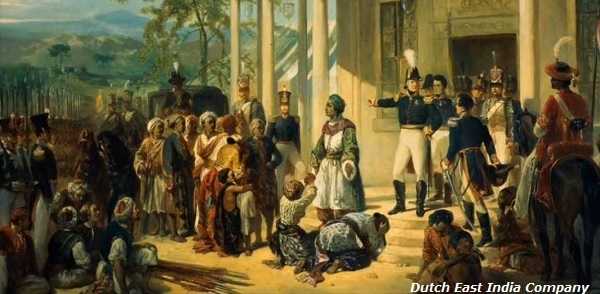
- Modern Indian History - Home
- Decline of Mughal Empire
- Bahadur Shah I
- Jahandar Shah
- Farrukh Siyar
- Muhammad Shah
- Nadir Shah’s Outbreak
- Ahmed Shah Abdali
- Causes of Decline of Mughal Empire
- South Indian States in 18th Century
- North Indian States in 18th Century
- Maratha Power
- Economic Conditions in 18th Century
- Social Conditions in 18th Century
- Status of Women
- Arts and Paintings
- Social Life
- The Beginnings of European Trade
- The Portuguese
- The Dutch
- The English
- East India Company (1600-1744)
- Internal Organization of Company
- Anglo-French Struggle in South India
- The British Conquest of India
- Mysore Conquest
- Lord Wellesley (1798-1805)
- Lord Hastings
- Consolidation of British Power
- Lord Dalhousie (1848-1856)
- British Administrative Policy
- British Economic Policies
- Transport and Communication
- Land Revenue Policy
- Administrative Structure
- Judicial Organization
- Social and cultural Policy
- Social and Cultural Awakening
- The Revolt of 1857
- Major Causes of 1857 Revolt
- Diffusion of 1857 Revolt
- Centers of 1857 Revolt
- Outcome of 1857 Revolt
- Criticism of 1857 Revolt
- Administrative Changes After 1858
- Provincial Administration
- Local Bodies
- Change in Army
- Public Service
- Relations with Princely States
- Administrative Policies
- Extreme Backward Social Services
- India & Her Neighbors
- Relation with Nepal
- Relation with Burma
- Relation with Afghanistan
- Relation with Tibet
- Relation with Sikkim
- Relation with Bhutan
- Economic Impact of British Rule
- Nationalist Movement (1858-1905)
- Predecessors of INC
- Indian National Congress
- INC & Reforms
- Religious & Social Reforms
- Religious Reformers
- Women’s Emancipation
- Struggle Against Caste
- Nationalist Movement (1905-1918)
- Partition of Bengal
- Indian National Congress (1905-1914)
- Muslim & Growth Communalism
- Home Rule Leagues
- Struggle for Swaraj
- Gandhi Assumes Leadership
- Jallianwalla Bagh Massacre
- Khilafat & Non-Cooperation
- Second Non-Cooperation Movement
- Civil Disobedience Movement II
- Government of India Act (1935)
- Growth of Socialist Ideas
- National Movement World War II
- Post-War Struggle
- Clement Attlee’s Declaration
- Reference & Disclaimer
Modern Indian History - The Dutch
The weakening of Portuguese enabled the English and the Dutch merchants to use the Cape of Good Hope route to India and so to join in the race for empire in the East.
At the end, the Dutch gained control over Indonesia and the British over India, Ceylon, and Malaya.
In 1595, four Dutch ships sailed to India via the Cape of Good Hope.
In 1602, the Dutch East India Company was formed and the Dutch States General (the Dutch parliament) gave it a Charter empowering it to make war, conclude treaties, acquire territories, and build fortresses.

The main interest of Dutch was not in India, but in the Indonesian Islands of Java, Sumatra, and the Spice Islands where spices were produced.
Dutch forced back the Portuguese from the Malay Straits and the Indonesian Islands and, in 1623, defeated English who attempted to establish themselves on the islands.
In the first half of 17th century, Dutch had successfully seized the most important profitable part of Asian trade.
-
Dutch also established trading depots at −
Surat, Broach, Cambay, and Ahmadabad in Gujarat;
Cochin in Kerala;
Nagapatam in Madras;
Masulipatam in Andhra
Chinsura in Bengal;
Patna in Bihar; and
Agra in Uttar Pradesh.
In 1658, also conquered Ceylon from the Portuguese.
Dutch exported indigo, raw silk, cotton textiles, saltpeter, and opium from India.
Like the Portuguese, Dutch treated the people of India with cruelty and exploited them ruthlessly.